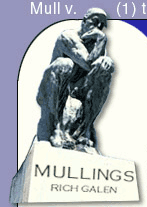|
|

|

Click here to keep up with Galen's Speaking Schedule
Looking for a back issue of Mullings? They're in the
Archives
Speech & Debate Clause
 Monday August 5, 2002
Monday August 5, 2002
Click here for an Easy Print Version
A MULLINGS EXCLUSIVE! The Transcript of the Clinton interview with an Israeli Recruiting Sergeant!
Right
HERE!
- Earlier this year, the Congress established a committee made up of Representatives and Senators to investigate whether better methods and/or better coordination and cooperation between intelligence agencies might have headed off the September 11 attacks.
- In the course of that inquiry someone - it appears someone in the Congress - leaked secret information about some message traffic intercepted by National Security Agency in the days before the attacks.
- After these leaks were published, the Congress asked the FBI to investigate to see who did it.
- As part of that investigation, the FBI has performed polygraph tests on staff members who had access to the information in question.
- Staff members who are seeking security clearances go through the same background check as any other employee in the Federal government. Every other federal employee except for the President and the Vice President.
- And the 535 elected members of the House and Senate.
- Many moons ago, when I was on the staff of Senator Dan Quayle, he asked that I help with his work on the Senate Armed Services Committee.
- I underwent not one, but two, background checks. One conducted by the FBI on behalf of the Department of Energy which has control of nuclear weapons. The other by the Defense Department to have access to classified documents it controls.
- To save you sending an e-mail, I passed. Both.
- The matter of Members of Congress undergoing background checks became an issue when it was discovered
that Congressman Gary Condit was a member of the House Intelligence Committee ("A Question of Privilege" Mullings, July 25, 2001).
- The Defense Department and the FBI are both agents of the Executive Branch. When last we looked, the FBI can and does investigate violations of federal law involving members of the House and Senate.
- For more on this issue, see recent press reporting on the investigations into former Congressman James "But-It-Was-A-High-Quality-Wig" Traficant and soon-to-be former Senator Robert "I'm-Not-Sure-What-I'm-Apologizing-For" Torricelli.
- At issue is the fundamental doctrine of our Constitution known as the "separation of powers," a phrase which does not appear anywhere in the document.
- The framers of the Constitution were eager to create a system of governance different from England's where, under its Parliamentary system, the Prime Minister is the head of government and, as such, appoints the cabinet ministers. When the Parliament changes parties, the ministers change as well.
- An important part of the "separation of powers" doctrine is what is known in Your Nation's Capital as "the speech and debate clause" of the Constitution.
- It is officially Article 1, Clause 2, Section 6. The applicable portion reads:
[Members of the House and Senate] shall in all cases, except treason, felony and breach of the peace, be privileged from arrest during their attendance at the session of their respective Houses, and in going to and returning from the same; and for any speech or debate in either House, they shall not be questioned in any other place.
- There was a time when being privileged from arrest going to and returning a session was interpreted as being immune from parking tickets in the District of Columbia but, alas, the days of borrowing your boss' car to have lunch downtown, knowing you wouldn't get a ticket, are long gone.
- The reasoning behind this clause was to prevent an out-of-control Executive Branch (read, "The Crown" back in the late 1700's) from using its police powers to either jail enough members of Congress to stop the Congress from doing business, or using its police powers to intimidate Members of the legislative branch into doing its bidding.
- Forcing Members of the House and Senate to undergo polygraph tests by the FBI comes perilously close to providing a method of intimidation, and sets a dangerous precedent.
- Representatives and Senators should not have to pass polygraph tests conducted by the Executive Branch. That's the check.
- In return, they will give up some of the moral ground they own in demanding highly classified information from the Executive Branch. That's the balance.
- Checks and balances. That's the way our system works.
- On the Secret Decoder Ring page today: The Senate resolution on that investigating committee, a short primer on the separation of powers doctrine, a short history of Dan Quayle, and the usual things.
--END --
Copyright © 2002 Richard A. Galen
If you are working at a lobbying firm, a government affairs office, a coalition, or a PAC you should take a
look at this page to see how advertising in Mullings might serve your organization very well:
Current Issue |
Secret Decoder
Ring | Past
Issues | Email
Rich | Rich
Who?
Copyright �1999 Richard
A. Galen | Site design by Campaign
Solutions. | |
|
